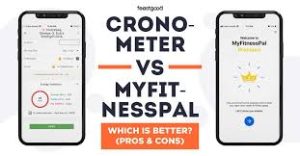Interface:
When it comes to tracking your diet and improving your health, two names often pop up: Cronometer and MyFitnessPal. Both apps are incredibly popular in the United States, especially in health-conscious states like California, where fitness and nutrition are part of everyday life.
Whether you’re a dedicated fitness enthusiast, a busy professional trying to eat better, or just someone looking to understand your diet, both apps promise to make your journey easier. But which one is the right fit for you? Let’s dive deep into the features, usability, and strengths of Cronometer and MyFitnessPal to help you decide.

What Do Cronometer and MyFitnessPal Offer?
Cronometer:
Cronometer is all about precision. It offers a detailed breakdown of not just macronutrients (like protein, carbs, and fat) but also micronutrients such as vitamins, minerals, and amino acids. For people who want a comprehensive view of their nutrition, Cronometer is a standout.
MyFitnessPal:
MyFitnessPal, on the other hand, is focused on simplicity and convenience. It’s an all-in-one app for tracking calories, food intake, and exercise. Its massive food database and user-friendly design make it a popular choice for beginners and those looking to manage their weight.
Both apps aim to make diet tracking seamless, but they cater to slightly different needs. Let’s see how they compare in key areas.
1. Interface and Usability
Cronometer:
Cronometer has a clean, data-driven interface. The app presents a lot of information at once, which can be overwhelming for first-time users. However, for those who love analyzing their nutrition in detail, this is a strength.
MyFitnessPal:
MyFitnessPal excels in ease of use. Its interface is simple, intuitive, and designed for quick food logging. Even if you’ve never used a diet tracker before, MyFitnessPal makes it easy to get started.
Winner: MyFitnessPal for its beginner-friendly interface.
2. Food Database Accuracy
Cronometer:
Cronometer’s food database is built from verified sources like the USDA and other trusted organizations. This means you get highly accurate nutrition data, which is crucial for those with medical needs or strict diets.
MyFitnessPal:
MyFitnessPal boasts one of the largest food databases in the industry. However, much of this data is user-generated, which can lead to inaccuracies. While it’s great for convenience, it might not be the best option if precision is your priority.
Winner: Cronometer for its accuracy and reliability.
3. Customization and Goal Setting
Cronometer:
Cronometer allows users to set detailed goals for macros, micronutrients, and specific biometrics like cholesterol or blood sugar. It’s highly customizable for people following diets like keto, vegan, or paleo.
MyFitnessPal:
While MyFitnessPal lets you set calorie and macro goals, it doesn’t provide the same level of micronutrient tracking. However, it offers great customization for fitness goals, including workout integration.
Winner: Cronometer for detailed dietary customization.
4. Fitness and Activity Integration
Cronometer:
Cronometer integrates with fitness apps like Fitbit, Garmin, and Apple Health. However, its primary focus remains on nutrition tracking rather than exercise.
MyFitnessPal:
MyFitnessPal shines in this area. It connects seamlessly with nearly every fitness tracker on the market, including Samsung Health and Garmin. For those who want to track both diet and workouts, this app is ideal.
Winner: MyFitnessPal for fitness tracking and integration.
5. Cost and Premium Features
Cronometer:
Cronometer’s free version is robust, offering features like detailed nutrient tracking and diet planning. The premium version costs $8.99/month and includes advanced metrics, trends, and data exporting.
MyFitnessPal:
MyFitnessPal’s free version is more limited, especially for advanced users. Many features, like meal insights and macro breakdowns, require a premium subscription, which costs $19.99/month—over double the cost of Cronometer.
Winner: Cronometer for affordability and value.
6. Compatibility with Special Diets
Cronometer:
If you follow a specific diet like keto, paleo, or vegan, Cronometer is a fantastic choice. It offers in-depth tracking for micronutrients, ensuring you meet your dietary needs.
MyFitnessPal:
MyFitnessPal is better suited for general calorie counting or balanced diets. While it supports macro tracking, it doesn’t provide the same depth of analysis for special diets.
Winner: Cronometer for specialized diet support.
7. Social Features and Community
Cronometer:
Cronometer is more of a solo tool. It’s built for personal tracking and doesn’t focus on social interactions.
MyFitnessPal:
MyFitnessPal has a strong community aspect. You can connect with friends, join challenges, and share your progress, making it a great option for those who thrive on social accountability.
Winner: MyFitnessPal for its social and community features.
8. Data Privacy
Cronometer:
Cronometer is transparent about its data policies and doesn’t sell user information. For privacy-conscious users, this is a big plus.
MyFitnessPal:
MyFitnessPal has faced data breaches in the past. While it has improved its security, it doesn’t match Cronometer’s reputation for data privacy.
Winner: Cronometer for secure and transparent data handling.
Who Should Use Cronometer?
Cronometer is ideal for:
Health enthusiasts who want detailed nutrient tracking.
Individuals following strict diets like keto or vegan.
People who value accuracy over convenience.
Those looking for an affordable yet powerful tool.
Who Should Use MyFitnessPal?
MyFitnessPal is perfect for:
Beginners who want an easy-to-use app.
Those focused on calorie counting rather than detailed nutrient tracking.
Fitness enthusiasts who want seamless workout integration.
People who enjoy social features and community challenges.
Completion:
Both Cronometer and MyFitnessPal are excellent apps, but they cater to different needs. If you’re looking for precision, detailed nutrient tracking, and affordability, Cronometer is the way to go. On the other hand, if you prioritize ease of use, workout tracking, and social motivation, MyFitnessPal is your best bet.
In health-conscious states like California, where personalized wellness is a priority, either app can help you achieve your goals. Try them both, see which fits your lifestyle better, and take the first step toward a healthier you!




Leave a Reply